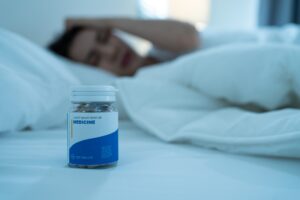Shocking DHEA Facts for Hormone Balance
DHEA (dehydroepiandrosterone) is a hormone produced by the adrenal glands that often goes unnoticed despite its vital role in health and longevity. Acting as a precursor to both testosterone and estrogen, it influences resilience, stress response, sexual vitality, and overall well-being. Levels of DHEA peak in early adulthood and decline steadily with age—dropping by as much as 80% by age 70. This decline is linked to a variety of health challenges, making DHEA an important biomarker for aging and vitality.
What Is DHEA and Why Does It Matter?
DHEA serves as a foundation for multiple hormones, adjusting dynamically based on the body’s needs. If the body requires more testosterone or estrogen, DHEA can convert accordingly. This makes it a flexible hormone precursor that supports balance. Research suggests that maintaining adequate DHEA levels is associated with better energy, muscle preservation, and stress resilience.
DHEA is sometimes referred to as a “Swiss Army knife” hormone due to its wide-ranging influence across different systems in the body.
The Effects of Low DHEA
When DHEA levels decline, health consequences can emerge. Low levels are associated with:
- Higher risk of frailty and sarcopenia (muscle loss)
- Increased insulin resistance and type 2 diabetes risk
- Reduced cognitive performance and brain protection
- Immune system imbalance and vulnerability to illness
- Shortened telomeres, a marker of accelerated aging
Studies also suggest DHEA supports neurological resilience, protecting against age-related decline in brain function (PubMed).
DHEA, Cortisol, and Stress Balance
One of the most important relationships DHEA has is with cortisol, the body’s primary stress hormone. DHEA helps keep cortisol in check, preventing chronic stress from overwhelming the system. Integrative practitioners often assess the ratio of cortisol to DHEA as a measure of stress resilience.
In early stages of stress, cortisol rises while DHEA attempts to keep pace. Over time, prolonged stress can exhaust the adrenal glands, resulting in lowered production of both cortisol and DHEA. This pattern may contribute to fatigue, burnout, and reduced immune defense.
DHEA and Aging
Because DHEA declines so sharply with age, its loss has been tied to many hallmarks of aging. Adequate levels support muscle recovery, stamina, and sexual health. DHEA supplementation has been studied for improving libido in both men and women, with clinical trials showing benefits for arousal and satisfaction (NIH).
Differences in Men and Women
DHEA does not act identically in men and women. For women, supplementation is more likely to convert into testosterone, making cautious dosing essential. For men, DHEA may provide modest testosterone support, but is often more valuable for its role in stress balance and recovery rather than direct hormone replacement.
Forms and Dosages of DHEA
DHEA is widely available over the counter in the United States, typically in capsule form ranging from 10 to 100 mg. It is also available as creams, sublingual liquids, and compounded preparations. However, medical guidance is strongly recommended before supplementation, as inappropriate dosing can lead to side effects such as acne, oily skin, excess hair growth, or worsening of conditions like PCOS in women.
Typical approaches include:
- Women: 5–25 mg daily, often starting at the lowest end
- Men: 25–50 mg daily, depending on age and activity
Higher doses should only be used under professional supervision, as excessive androgenic effects may occur.
Integrative vs. Conventional Approaches
In conventional medicine, DHEA is sometimes prescribed narrowly—for example, as a topical cream to address vaginal dryness in women. Integrative medicine takes a broader approach, using DHEA as part of longevity, performance, and resilience strategies. Athletes, professionals under chronic stress, and individuals seeking better recovery may all benefit when carefully guided by testing and monitoring.
Sexual Health and DHEA
DHEA supplementation has been linked to improvements in sexual function for both men and women. In men, studies show potential benefits for erectile function and libido, particularly when testosterone is low. For women, DHEA may improve desire, arousal, and satisfaction, with topical forms approved by the FDA for treating vaginal atrophy and painful intercourse.
Should You Supplement with DHEA?
Not everyone needs DHEA supplementation. Younger adults generally produce sufficient levels naturally, and active lifestyles often help preserve function longer. Supplementation is more relevant for middle-aged and older adults, or those experiencing symptoms of low resilience, poor stress recovery, or hormonal imbalance.
Importantly, “normal” lab ranges may not always equal “optimal.” Integrative medicine often aims for the higher end of the reference range to provide a buffer against daily stressors and age-related decline.
Video Summary
For more evidence-based nutrition and fitness tips, subscribe to our channel: https://www.youtube.com/@Vitality-and-Wellness
Disclaimer: This content is for educational purposes and does not replace personalized medical advice.



